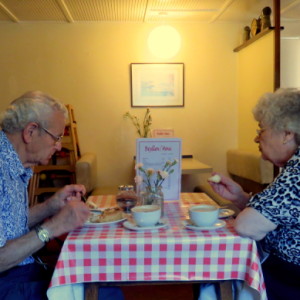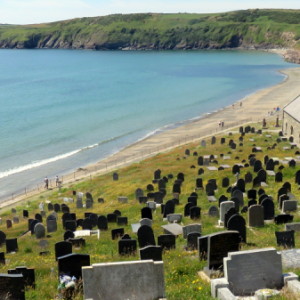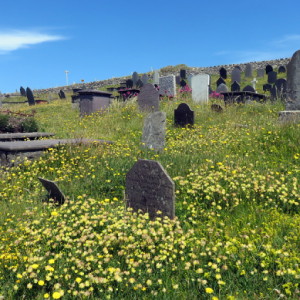Sun and son in Pwllheli
We took a two-bus trip down the Lleyn peninsula, the arm that stretches out into the sea from the north-west corner of Wales. We stopped first in Pwllheli, an old-fashioned seaside town that has long been a holiday destination for families and retired couples such as the one I snapped in the classic cafe where we stopped for coffee 'I could have eaten another one of these' he said, regarding his pie.
We made a brief tour of the narrow streets with some curious old shops etc., before taking the next bus, bouncing along windey lanes through impossibly green fields dotted with impossibly glossy cows and gleaming sheep: a sort of farm animal heaven.
The perfection of the midsummer day belied the habitual bleakness of this exposed peninsula: reaching the end of the road at Aberdaron it was obvious that the village crouches to withstand gales - the houses huddled together and the church positioned only feet above the sea (just like the one back home in Pembrokeshire that was devoured by a storm 150 years ago).
Aberdaron church has become renowned as the last living held by RS Thomas the famously craggy and uncompromising poet who sequestered himself here in his final years, communing more easily with the sea birds and the rugged landscape than with his god or his flock.
What amazed me most was the churchyard: inclined at a very steep angle and thick with beautifully carved slate gravestones, it was a tapestry of wild flowers in such abundance as I have never before seen: lady's bedstraw, trefoil, clover, valerian, orchids all jostled for space. And with them birds, bees, butterflies, grasshoppers and all manners of other insects flitting and jumping and buzzing to exploit the floral paradise. It was almost tempting to envy those lying under such a counterpane in such a location above the blue. blue expanse of sea and sky...
On the beach below a few sunbathers stretched out on the sand, a black poodle stood in the shallows eyeing a ball and wagging its tail hopefully, a man in a wide-brimmed hat bobbed gently in an inflatable and it all seemed a very long way from the troubles of the world.
Beyond the headland, out of sight, the island of Bardsey represents an even further step away from civilisation but we could not get there today. Two tiny islets, Big and Little Gull, shimmered closer in to shore.
Extra images for anyone interested. I was curious as to why the weeping willow motif was so very popular on grave markers here - maybe it reflects the prevailing weather pattern for most of the year.




Comments
Sign in or get an account to comment.


